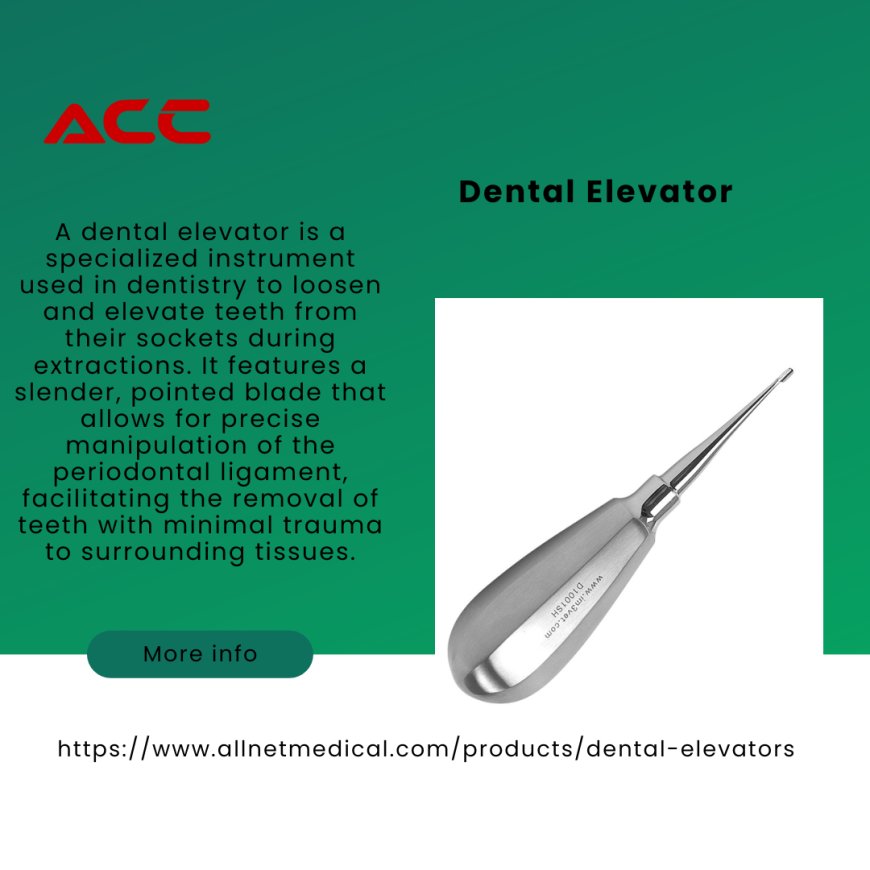Importance of Dental Instruments
In the field of dentistry, having the right tools is essential for ensuring successful procedures and patient comfort.
In the field of dentistry, having the right tools is essential for ensuring successful procedures and patient comfort. One such tool is the dental elevator, a critical dental instrument widely used in extractions and oral surgery. While patients often recognize forceps as the primary tool for tooth removal, the dental elevator plays an equally important role. This article explores the significance of the dental elevator, its functions, and why it is indispensable in modern dental practice.
1. Key Function of Dental Elevators
The primary purpose of a dental elevator is to aid in the extraction of teeth by loosening the tooth from its socket before the actual removal with forceps. This step is crucial in ensuring that the tooth is moved out gently and safely without damaging the surrounding bone or soft tissues.
By using the dental elevator, the dentist creates space around the tooth, separating it from the periodontal ligament and making the extraction less traumatic. This instrument acts as a lever, helping to ease the tooth out of its tight space, especially in cases where the tooth is difficult to reach or impacted.
2. Facilitating Complex Extractions
The dental elevator becomes even more critical when dealing with complex extractions, such as those involving impacted teeth or roots. In situations where the tooth is partially or fully covered by bone or soft tissue, forceps alone are often not sufficient. The dental elevator can help by loosening the tooth or root, providing the necessary leverage to complete the extraction without excessive force.
For example, in the case of wisdom teeth extractions, which are often impacted or angled awkwardly, the use of a dental elevator helps to separate the tooth from its surrounding structures. This ensures a more controlled and efficient extraction process, reducing the risk of complications like bone fractures or damage to adjacent teeth.
3. Reducing Trauma and Improving Patient Comfort
One of the most important benefits of the dental elevator is its ability to reduce trauma during tooth extractions. The force required to remove a tooth with only forceps can sometimes cause unnecessary strain on the surrounding bone and tissue. By using a dental elevator to loosen the tooth first, the need for excessive force is minimized.
This results in a smoother, less painful extraction for the patient, as well as a faster recovery time. Minimizing tissue trauma also lowers the chances of post-operative complications, such as swelling, infection, or prolonged bleeding.
4. Supporting Atraumatic Extractions
In modern dentistry, there is a growing emphasis on atraumatic extractions, which prioritize the preservation of surrounding bone and tissue, especially when preparing for dental implants. The dental elevator plays a key role in this approach by gently loosening the tooth from its socket without causing unnecessary damage.
By using luxating elevators, which are specially designed to cut the periodontal ligament and gently push the tooth out, dentists can remove teeth in a way that preserves as much bone as possible. This is especially important when planning for implant placement, as healthy bone is essential for implant stability and success.
5. Versatility in Dental Procedures
The dental elevator is not only used in tooth extractions but also serves a variety of functions in other oral surgeries. For instance, periosteal elevators are used to lift soft tissue and expose the underlying bone during procedures like bone grafting or implant placement.
In cases of broken or fractured teeth, the dental elevator can also be used to remove fragments or roots left behind after part of the tooth has broken off. This versatility makes the dental elevator a vital tool in both simple and complex dental procedures.
6. Importance in Training and Expertise
While the dental elevator is an essential tool, its effectiveness depends on the skill and expertise of the dentist using it. Improper use of the elevator can lead to complications, such as damage to the surrounding bone or adjacent teeth. Therefore, dental professionals undergo thorough training to learn how to use the dental elevator effectively and safely.
The ability to apply the right amount of pressure, angle the elevator correctly, and know when to stop using the tool is crucial for ensuring a successful extraction or procedure. This expertise ensures that the dental elevator contributes to better patient outcomes and reduces the risk of complications.
7. Enhancing Surgical Efficiency
The dental elevator also plays an important role in improving the efficiency of dental surgeries. By loosening the tooth and separating it from the surrounding structures, the elevator allows for a quicker and more controlled extraction. This is particularly beneficial in surgeries that involve multiple teeth or more complex cases, where precision and speed are essential for minimizing patient discomfort and time under anesthesia.
By speeding up the extraction process while maintaining safety and precision, the dental elevator helps dentists complete procedures more effectively, ultimately benefiting both the dental professional and the patient.
Conclusion
The dental elevator is an indispensable dental instrument that plays a critical role in modern dentistry. From loosening teeth and reducing trauma during extractions to supporting atraumatic procedures and enhancing surgical efficiency, the importance of the dental elevator cannot be overstated. Its ability to aid in complex extractions and improve patient comfort makes it a key tool in ensuring successful dental procedures and positive patient outcomes.
As dental techniques continue to advance, the dental elevator will remain an essential part of every dentist’s toolkit, contributing to safer, more efficient, and less traumatic extractions.
More info: AllNet
What's Your Reaction?

























